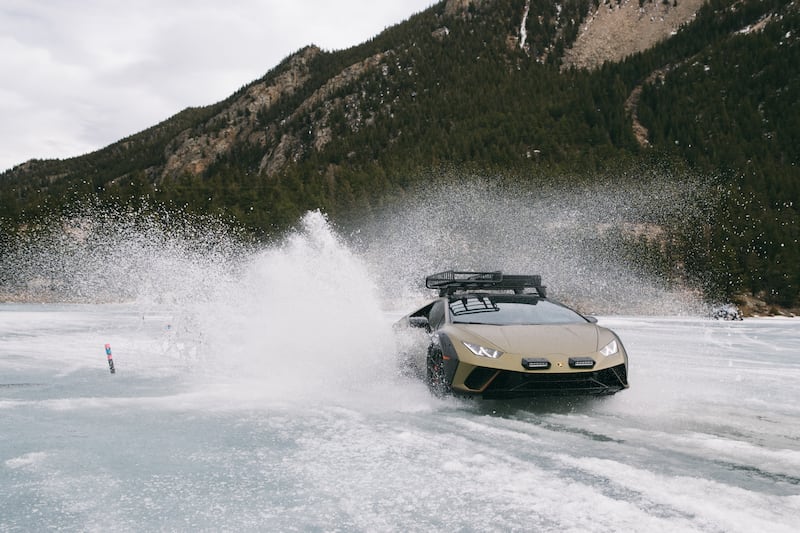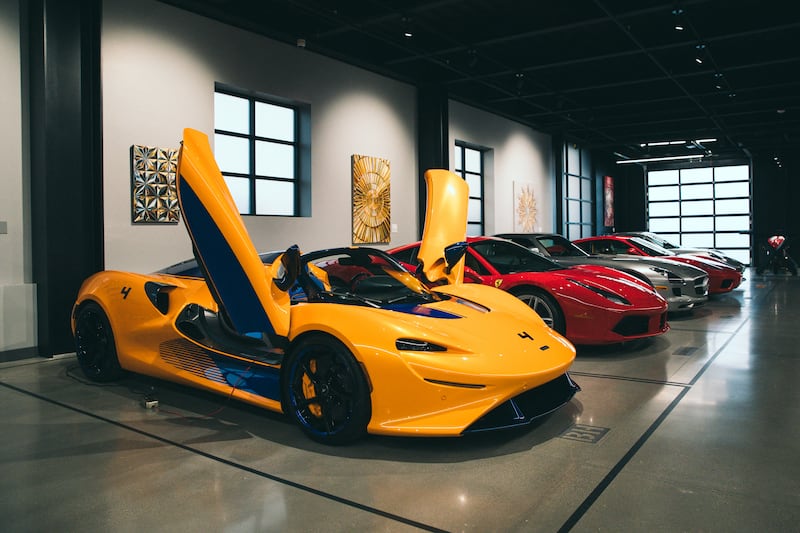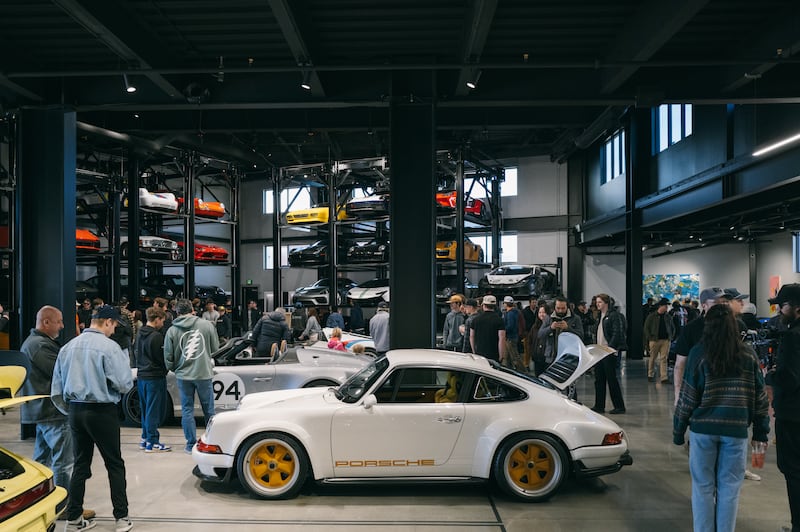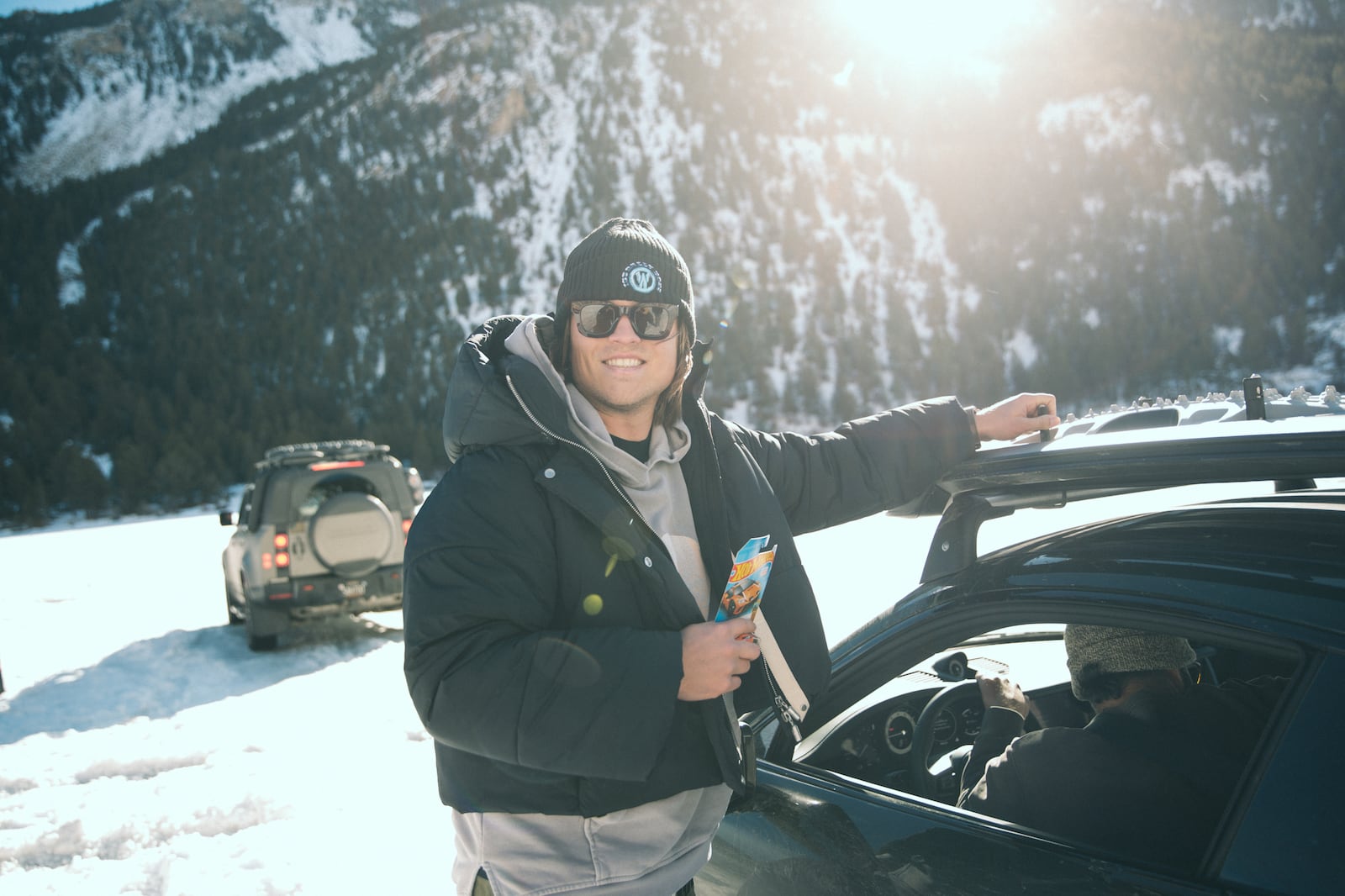In 2019, 23-year-old Jake Wolf arrived at Boneyard Saloon in Park City, Utah, for his first meeting with TJ Parker. He wasn’t sure what to expect, but he’d polished up a starter version of his business plan just in case.
Here’s what Wolf knew when he walked into the saloon: Just a year before, at the age of 32, Parker had made a reported $100 million when he sold his online pharmacy, PillPack, to Amazon for $1 billion. Parker had recently relocated to Park City and wanted advice on building a car collection.
And here’s what Parker knew about Wolf: This “young kid” from Miami had built his first spreadsheet at age nine tracking values of Lamborghini Diablos, had already had some success running a collector-grade designer clothing business he started in college, and had become a car whisperer to wealthy Miami collectors. Parker knew Wolf helped these car aficionados buy and sell Lamborghinis, Ferraris and other supercars. He’d also heard that Wolf had big plans for an aesthetically designed, rare car storage venue with a twist: a social club for car enthusiasts.
While checking out cars for his clients in Miami, Wolf realized collectors were often forced to keep their cars in dusty, dirty warehouses rather than in spaces where they could show them off.
“Seeing that … and going to different social clubs in Miami and Palm Beach, I thought, ‘Why wouldn’t you just merge all these together? Solve for the car ownership experience but then also elevate their lifestyle with a social club that creates community?” Wolf says.

A few months before that meeting at Boneyard, Wolf’s attempt to lease a 5,000-square-foot space to launch his idea in Miami fell through. Now, after a first meeting that quickly turned into a business brainstorming session, Parker was ready to invest in Wolf’s big dream: a warehouse where rare Lamborghinis, Ferraris and Porsches would be displayed like works of art in a gallery; a country club for car enthusiasts looking for community; an event business creating high-end member experiences like Sunday car rallies, racetrack driving and a European rally to Monaco for the Grand Prix. Wolf could have the funding he needed to begin the journey toward his grand vision of building a network of locations in more than 20 cities.
Wolf could have all that on one condition: He had to launch the big dream in Park City, not Miami. He could go big in Utah or go home.
A Miami concept that bloomed in Park City
Within minutes of that first meeting, Parker says he saw a rare balance of confidence and humility in Wolf. Parker himself had been only 26 when he started PillPack, after all, and he was impressed by the young entrepreneur’s combination of passion, knowledge, ambition and modesty.
Wolf grew up middle class in Charlotte, North Carolina, and while he had traveled with his family to Park City for snowboarding and mountain biking, he hadn’t been back since 2013. He had no idea whether Utah had enough investment-grade car collectors to support his big idea.
“I was 100 percent scared,” Wolf says. “To go from the supercar capital of the world in Miami to little Park City with just 8,000 people was super daunting.”
Nevertheless, he took the leap. Now, at 29 years old, Wolf oversees the immaculate 27,000-square-foot WAREHOUSE Motor Club — a veritable sculpture garden of pristine cars positioned beneath original paintings thoughtfully curated by the Julie Nester Gallery. The social club features a restaurant, two bars, racing simulators, a golf simulator and a corporate event space. Wolf’s gleaming blue 1998 Lamborghini Diablo SV Monterey Edition, which he bought off Craigslist for $140,000 and had rebuilt, watches over the event space. It’s one of only 20 in the world.
WAREHOUSE has experienced a level of demand that makes Wolf shake his head. Eighty-six cars are stored onsite, and another 41 are stored in an auxiliary space across the street. The social club boasts 160 members with room for another 80. Thirty-one percent of members store cars at WAREHOUSE, and social members who don’t store cars have access to a small fleet of unique sports cars and off-road vehicles. Wolf’s dream of expanding WAREHOUSE into a national network of motor clubs is in motion. He packed his bags for Utah, took the risk and never turned back.
“I just trusted my partners,” Wolf says. “They kept saying Park City speaks to the ethos of what we’re trying to do at WAREHOUSE. Real enthusiasts come out here because Utah is the best place in the world for skiing, the best place for mountain biking. If I’m in Miami with a Porsche or Lamborghini, I’m going stoplight to stoplight. But 10 minutes away from here, we have some of the best driving roads in the United States.”

A gallery for “internal combustion works of art”
In the four years leading up to WAREHOUSE’s grand opening in January 2024, the concept kept expanding on Wolf. He quickly realized no existing space in Park City was large enough, so Wolf and his partners bought real estate just off Old Highway 40 to build the structure. If they could store 33 cars and attract a minimum of 100 club members, he calculated, they could make the return on investment work.
Then, just as Wolf was planning construction, COVID-19 struck. By the time bids came back, he had to tell his partners that the cost to build WAREHOUSE had doubled.
“I give Jake a lot of credit for that moment,” says Parker, whose own business survived several near-death experiences. “On the one hand, you want to be empathetic to your investors and see where they’re coming from. On the other hand, he was full steam ahead. He knew he could figure it out and was confident in the path forward. As an investor, you want to feel heard, but you also want an entrepreneur who’s going to go and figure it out. And Jake was very much that.”
For about two years, Wolf met potential members at Atticus Coffee on Main Street in Park City to pitch his vision. The 33 planned storage spaces sold out almost immediately. When Wolf learned that car enthusiasts are often also wine, travel and dining enthusiasts, a planned wet bar became a fine-dining restaurant, and a planned schedule of two monthly member social events became two events per week. Wolf has forged partnerships with Salt Lake City car dealers, wine shops, an omakase sushi restaurant and luxury watch dealers. He seeks to partner with Utah businesses that “care about excellence as much as we do.”
Until you talk to Wolf, you might wonder how a young founder in his mid-20s could have persuaded so many tech entrepreneurs, Fortune 500 executives and recently exited business owners to take a chance on him. But spend a few minutes with him amid a blur of primary colors — Ferrari and Porsche reds and Lamborghini yellows and blues — and you’ll realize you’re with not just a car guy but a passionate gallery owner showing off, as the WAREHOUSE website says, a $50 million “internal combustion works of art” collection.
Chris Apgar, a WAREHOUSE member who divides his time between Park City and New York (where he serves on the Contemporary Arts Council at The Museum of Modern Art), says he was initially drawn to Wolf’s artistic sensibility.
“I’m not a gearhead. I love cars as objects and almost from a sculptural standpoint,” Apgar says. “What I think is amazing is [Wolf’s] level of sophistication and his taste level. It’s really impressive for a young man. It’s not just a bunch of cars in a warehouse; it’s a really beautifully curated space. … It appeals to someone who has an appreciation for connoisseurship, whether that’s watches, art, cars or collectibles. That’s what drew me to the club.”
“At the beginning, it was going to be very automated: park your own car, limited social member appeal. We really shifted our lens. We want to be the best social club in Park City regardless of cars.”
— Jake Wolf
Last year, Apgar and his wife Liz joined other WAREHOUSE club members on a European rally, driving through Italy, Austria and Germany and making stops at race tracks, car factories, museums and Michelin-star restaurants. The trip culminated in Monaco for the Formula One Grand Prix. In the grand business plan he dared not bring to that first meeting, Jake had always envisioned this rally as his “halo event.”
As a high-level donor to museums, Apgar is no stranger to exclusive trips that coordinate access to rare places and experiences. He describes the WAREHOUSE European rally as “seamless,” “elegant” and on par with any of these other trips he’s been on.
“It was mind-boggling,” he continues. “You have a young man who was 28, and most of the employees at WAREHOUSE are in that same age range, and they put together a trip where you’re going to places you could never find on your own. … What I’m impressed with is this young man is basically in the hospitality business, and he has the ability to listen to people. When he’s speaking with you, he makes it feel like what you are saying is important. … I think he’s got a vision, and he’s got people behind him who believe in that vision, too.”
Parker is one of those people, and he plans to invest in new locations alongside the local investors Wolf is lining up.
“I feel really good [about my investment so far],” Parker says. “The quality and the breadth of the cars is pretty stunning. [Wolf] did an incredible job finding the right clients and filling the place with a really nice balance of cars. That is sort of step one. … And as an investor, the business is performing as well as I could have expected.”
New cities and new investors
WAREHOUSE has multiple revenue streams: a one-time initiation fee, monthly membership dues with minimum spends, event revenue and full-service car storage fees. Its dealership buys, sells and ships cars on behalf of members. Companies can rent the space for employee and client events. All of the art on display can be purchased, and WAREHOUSE collects a commission from every sale.
“The business today is night and day from what I originally expected,” Wolf says. “At the beginning, it was going to be very automated: park your own car, limited social member appeal. We really shifted our lens. We want to be the best social club in Park City regardless of cars.”

WAREHOUSE has 16 employees — six of them full-time — and Wolf recently hired a new manager for the Park City location so he can spend part of 2025 developing expansion plans. He says he is actively talking with investors in six locations: Orange County, California; Austin and Dallas, Texas; Miami and Palm Beach, Florida; and Denver, Colorado. He hopes to announce two new locations this year.
“We’re trying to go to these destination cities with big concentrations of wealth that have big car culture and natural connections with each other,” says Wolf, who has been listening to members to learn where they spend their time.
Wolf hopes to curate each new location with its own unique aesthetic design and geographically appropriate collection of cars. As he vetted cars for storage in Park City, for example, Wolf learned that Park City is very much a Porsche town — so he created a set of lifts that pays homage to some of the greatest canyon-hugging Porsches produced over the years. Visitors can stand in front of the cars, stacked four leve
ls high and four across, as Wolf explains in exquisite detail how Porsche’s design has evolved over the years.
Ever the curator, Wolf is very particular about which cars he accepts into storage. But his criteria is simple: “Is it going to bring a smile to other members’ faces?”

